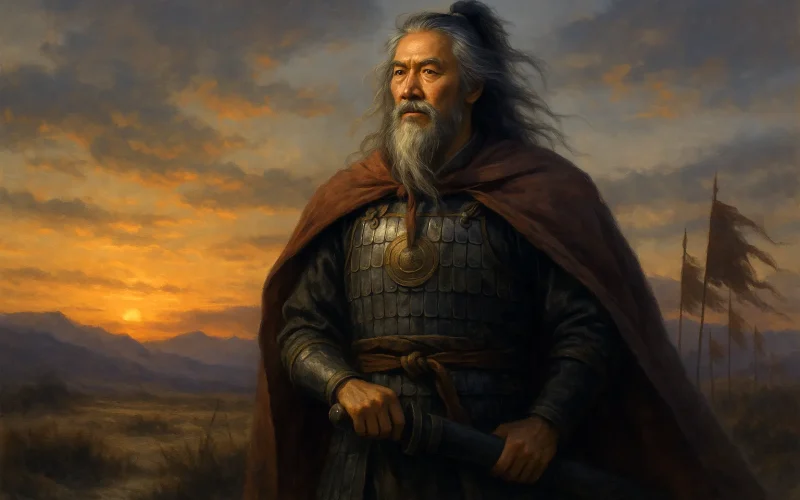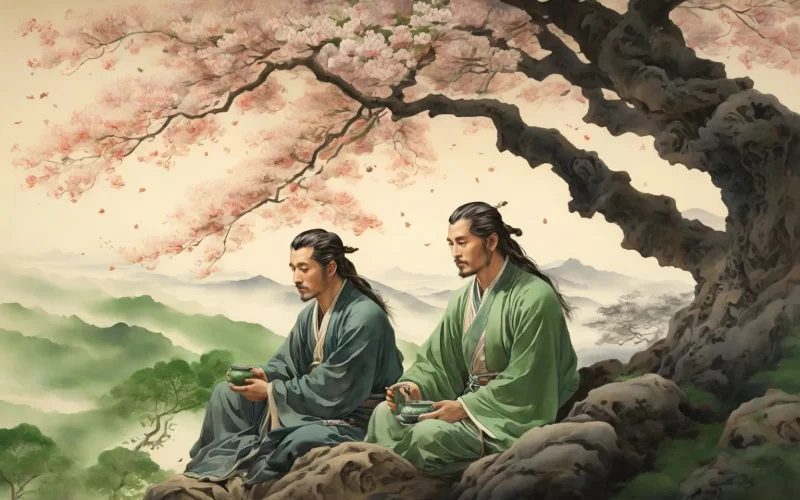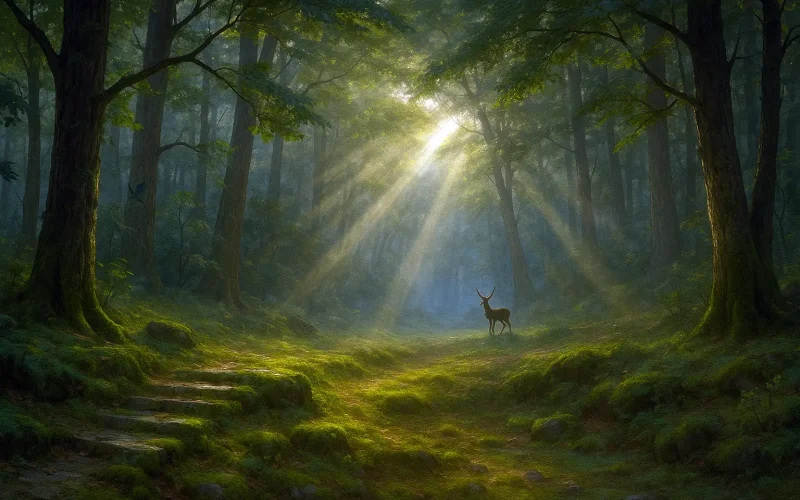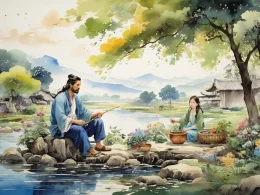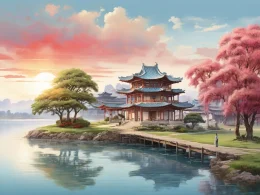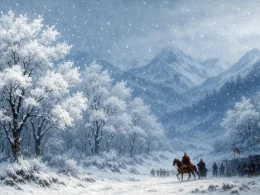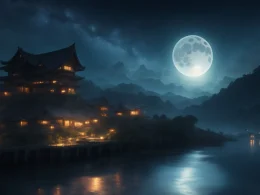「老将行」
王维
少年十五二十时,步行夺得胡马骑。
射杀山中白额虎,肯数邺下黄须儿。
一身转战三千里,一剑曾当百万师。
汉兵奋迅如霹雳,虏骑崩腾畏蒺藜。
卫青不败由天幸,李广无功缘数奇。
自从弃置便衰朽,世事蹉跎成白首。
昔时飞箭无全目,今日垂杨生左肘。
路旁时卖故侯瓜,门前学种先生柳。
苍茫古木连穷巷,寥落寒山对虚牖。
誓令疏勒出飞泉,不似颍川空使酒。
贺兰山下阵如云,羽檄交驰日夕闻。
节使三河募年少,诏书五道出将军。
试拂铁衣如雪色,聊持宝剑动星文。
愿得燕弓射大将,耻令越甲鸣吾君。
莫嫌旧日云中守,犹堪一战取功勋。
赏析:
这首诗作于唐代,是一首典型的边塞叙事诗,通过第一人称的方式勾勒了一位老将的一生:他曾少年英勇、战功赫赫,却因“无功”被弃,最终年华老去,潦倒田间。然而,尽管身处困境,老将的报国之志未曾消退,在战事再起之时仍跃跃欲试、请缨沙场。诗中既有英雄迟暮的悲凉,也有壮志未酬的慷慨,表现出诗人对封建制度下“功不如命”的不满和对忠诚英雄的深切同情。
第一部分:少年英雄,功盖沙场
第一联:“少年十五二十时,步行夺得胡马骑。”
十五至二十岁时,步行冲敌夺马骑乘;曾射杀山中猛虎,岂肯将邺中少年放在眼里?
这两句勾画了老将少年时期的英勇与胆略。少年时,他便能够通过步行夺马,在战争中无畏无惧,身手非凡。这里的“夺得胡马骑”展示了他在敌阵中的强悍,也暗示他少年时并没有被过多的束缚,放肆地在沙场上纵横捭阖。接下来的“射杀山中白额虎”强化了其勇武,这样的英雄形象既让人敬佩,也为后文他的命运走向奠定了基调。
第二联:“射杀山中白额虎,肯数邺下黄须儿。”
曾射杀山中猛虎,岂肯将邺中少年放在眼里?
这句用猎杀白额虎的壮举作对比,凸显了他少年时的勇敢和无所畏惧。通过“邺下黄须儿”这一表述,诗人形象地表达了少年时他对敌人轻视与不屑的心态,表现出一种极为自信甚至是蔑视的态度。这不仅为老将的早年辉煌打下基础,还为后文他的沦落与苦楚制造了鲜明对比。
第三联:“一身转战三千里,一剑曾当百万师。”
我曾独自征战千里,一剑之威可挡百万雄兵。
这两句进一步夸张了老将的英勇与威武。转战三千里,意味着他征战了广阔的疆域,历经多次战斗,不断赢得胜利。特别是“一剑曾当百万师”,诗人通过这一句提升了战斗的象征意义,暗示他曾凭一己之力改变战局。这样的描写赋予老将神话般的英雄色彩,显示了他在沙场上的不朽传说。
第四联:“汉兵奋迅如霹雳,虏骑崩腾畏蒺藜。”
汉军奔袭如雷霆震怒,敌人骑兵因布阵的铁蒺藜而惊恐逃散。
这一联展现了老将曾经参与的战役之激烈与残酷,强调了他对汉军迅捷如雷霆般的快节奏战争打法的推崇。通过“虏骑崩腾”和“畏蒺藜”的细节,揭示了敌军在面对汉军时的极度恐惧,仿佛每一次的进攻都能带来生死攸关的威胁,突出了战争的残酷和老将昔日的英勇。
第五联:“卫青不败由天幸,李广无功缘数奇。”
卫青能屡战不败,是因为天命保佑;李广虽英勇,却因命运不济,终究无功。
这一联通过提及历史上的两位大将,卫青和李广,突出了“命运”在战争与英雄命运中的重要性。卫青的屡战不败被认为是天命保佑,而李广虽然极具英雄气概,却因命运多舛,未能获得应有的功名。通过这两位英雄的对比,诗人意在揭示人生与功名往往不是单纯由勇敢决定的,而是受天命与运气的影响,这对于老将来说也是一种无奈的认知。
第二部分:壮志未酬,沉沦凄凉
第六联:“自从弃置便衰朽,世事蹉跎成白首。”
自从被弃不用,我就逐渐衰老,光阴荏苒,转眼白发满头。
这句揭示了老将从被弃的那一刻起,生活开始滑向低谷。被弃后的无力感和渐渐老去的身体状态,成为了他内心最深的痛。诗人通过这一句中的“衰朽”与“白首”表达了老将的深深惋惜与无奈,这些词汇揭示了年龄与时代给英雄带来的摧残,也为整首诗的情感基调奠定了凄凉的氛围。
第七联:“昔时飞箭无全目,今日垂杨生左肘。”
昔日百发百中的箭术早已荒废,如今连手臂也软弱得长出柳条。
这一联通过极具画面感的比喻,展现了老将从英勇少年到年老的衰败状态。昔日的箭术如同他最得意的武器,而如今他却连最基本的箭术也失去了。当“垂杨生左肘”这一比喻出现时,画面愈加生动,左肘如杨柳般软弱无力,这种反差让人感受到时间对英雄的不公与摧残。
第八联:“路旁时卖故侯瓜,门前学种先生柳。”
偶尔在路边卖瓜自给,家门前模仿隐士种树消遣。
这里使用了典故,提到“故侯瓜”和“先生柳”来衬托老将的落魄境地。“卖瓜”与“学种柳”的形象化描写让老将的身份与过往的英雄形象形成鲜明对比。曾经的沙场英雄,如今只能靠卖瓜自给,并在家门前学陶渊明般种树消遣。这种生活的转变,诗人通过冷静的叙述,带给读者一种深深的遗憾与不平。
第九联:“苍茫古木连穷巷,寥落寒山对虚牖。”
老树参天,空巷寥落,寒山对窗,一片凄冷萧索。
环境描写增强了诗歌的氛围感。古木与寥落的巷道,与诗人内心的孤独和无力感遥相呼应。寒山对窗的画面让人想象到老将独自面对寒冷的夜晚,既无战友,也无同伴,只有冷清的寂寞与苍凉的岁月在一旁作证。
第十联:“誓令疏勒出飞泉,不似颍川空使酒。”
我誓要像耿恭那样在疏勒绝地打出奇迹,不像灌夫那般只借酒发泄无用之气。
诗人通过这句话表达了老将心中的不甘和对英雄气概的坚持。他想效仿耿恭在危急时刻力挽狂澜,而不是像灌夫一样沉溺于无用的享乐中。这不仅是对自己的要求,也是对世人的告诫:英雄不应因年老而放弃斗志,必须要保持坚定的信念与行动。
第三部分:烽火重燃,请缨再战
第十一联:“贺兰山下阵如云,羽檄交驰日夕闻。”
贺兰山下战火再起,军情紧急,文书昼夜飞驰传送。
这一联的描写是诗歌高潮部分,战火重燃,国家进入紧急状态。“羽檄交驰”是对战时文书迅速传递的描写,羽檄是古时传令的工具,暗示着局势的紧张与迅速变化。
第十二联:“节使三河募年少,诏书五道出将军。”
朝廷在三河征募新兵,已有诏书调动大将出征。
这两句进一步强化了战争的迫切性,表明国家已经在准备新的战斗。诗人通过这一描写,也表达了老将尽管身处困境,但他对国家的忠诚与心中的渴望依然未变。
第十三联:“试拂铁衣如雪色,聊持宝剑动星文。”
试着拂去战甲上的灰尘,仍光亮如雪,随手舞剑,星光为之震动。
即便年老,老将的心仍如火热如初。这句用“铁衣如雪色”来形容战甲依旧光亮,突出老将的依旧雄心与武装自信。舞剑动星文,更是诗人借象征手法表现其不屈的战斗精神。
第十四联:“愿得燕弓射大将,耻令越甲鸣吾君。”
愿能再握燕弓,直取敌将首级,绝不容外敌惊扰我君王。
这一联表达了老将对战场的渴望以及忠心,他希望亲自出征,以燕弓射杀敌将,决不容外敌侵扰自己国家的安宁。老将的忠诚和责任感在这一联中得到了极致表现。
第十五联:“莫嫌旧日云中守,犹堪一战取功勋。”
请别轻视这位旧日的云中太守,我依然可以浴血疆场,重建功业。
诗人以“云中守”作为结尾,暗示老将曾是云中太守,拥有丰功伟业,但也表达了他如今对战场的渴望和决心。这一联使得整首诗的情感升华,呼应了全诗的主题:英雄未老,壮志犹存。
整体赏析:
这首诗是一幅完整的英雄写照图,从少年驰骋沙场、战功赫赫,到被弃不用、困居村野,再到风云再起、誓欲再战,诗人通过层层递进的叙述结构,塑造出一位身经百战、历经沉浮但始终不甘沉寂的老将形象。全诗笔力雄健,用典精当,情感真挚而动人,不仅展现出对个体命运的深刻关注,也批判了制度下功勋与仕途不成正比的现象。
写作特点:
- 叙事与抒情结合: 诗歌以自叙口吻展开,通过叙事呈现英雄的一生,同时又饱含情感,兼具史诗与抒情的力量。
- 对比映衬手法突出: 少年与老年、荣耀与清苦、热血与冷寂形成强烈对比,增强了诗的悲壮感。
- 用典自然贴切: 李广、卫青、耿恭、灌夫、陶潜等历史人物和典故信手拈来,丰富了内容,也提升了诗的文化深度。
- 语言凝练铿锵有力: 节奏明快,句句铿锵,具有很强的朗诵感和表现力。
启示:
这首诗既是对一位战功卓著却遭弃置的老将命运的深切同情,也是一曲壮志未酬的英雄悲歌。它告诫世人:真正的忠诚和能力不应被年老或误解所掩盖。历史的价值,不应以一时的得失论成败;忠诚的热血,不应因境遇的冷落而熄灭。在当今社会,那些默默无闻却甘于奉献的人,也应被看见、被珍惜。
整体赏析:
这首诗是一幅完整的英雄写照图,从少年驰骋沙场、战功赫赫,到被弃不用、困居村野,再到风云再起、誓欲再战,诗人通过层层递进的叙述结构,塑造出一位身经百战、历经沉浮但始终不甘沉寂的老将形象。全诗笔力雄健,用典精当,情感真挚而动人,不仅展现出对个体命运的深刻关注,也批判了制度下功勋与仕途不成正比的现象。
写作特点:
- 叙事与抒情结合: 诗歌以自叙口吻展开,通过叙事呈现英雄的一生,同时又饱含情感,兼具史诗与抒情的力量。
- 对比映衬手法突出: 少年与老年、荣耀与清苦、热血与冷寂形成强烈对比,增强了诗的悲壮感。
- 用典自然贴切: 李广、卫青、耿恭、灌夫、陶潜等历史人物和典故信手拈来,丰富了内容,也提升了诗的文化深度。
- 语言凝练铿锵有力: 节奏明快,句句铿锵,具有很强的朗诵感和表现力。
启示:
这首诗既是对一位战功卓著却遭弃置的老将命运的深切同情,也是一曲壮志未酬的英雄悲歌。它告诫世人:真正的忠诚和能力不应被年老或误解所掩盖。历史的价值,不应以一时的得失论成败;忠诚的热血,不应因境遇的冷落而熄灭。在当今社会,那些默默无闻却甘于奉献的人,也应被看见、被珍惜。
关于诗人:

王维(701 — 761),字摩诘,号摩诘居士。河东蒲州(今山西运城)人。王维是一位山水田园诗人,这是现今人们对其人其诗的一般印象。他的山水田园诗,兴象超远、意趣幽玄,如《山居秋暝》:“空山新雨后,天气晚来秋。明月松间照,清泉石上流。”色韵清绝,广受后世读者喜爱。但王维其人,却从未真正成为山水田园之人。





